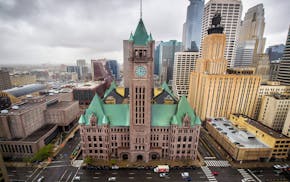Senate Republican Minority Leader David Hann was reciting the DFL tax bill's defects last Tuesday when he was asked about an item that wasn't in the 377-page Senate bill.
"Senator, are you as grateful as the press corps is that they didn't raise alcohol taxes?" the St. Paul Pioneer Press's Bill Salisbury asked.
Hann and the assembled reporters laughed. But Salisbury wasn't just joshing. He was jabbing what has long been one of the twitchiest nerves in Minnesota politics.
Folks in these parts have been disagreeing about alcohol consumption, regulation and taxation since Pig's Eye Parrant and his still were evicted from Fort Snelling in 1838. Undeterred, Parrant set up shop downriver and soon attracted settlers. Remember "the brew that grew with the great Northwest"? That was Schmidt's of St. Paul, the city that grew because of Parrant's brew.
But Minnesota was also the home of the congressional father of Prohibition, U.S. Rep. Andrew Volstead of Granite Falls. The Minnesota chapter of the Women's Christian Temperance Union was still large and durable enough in the 1970s for the Minneapolis Tribune to send a rookie reporter (me) to its state convention.
Alcohol can stir the Capitol. To date, the only "sin tax" that's tempting Gov. Mark Dayton and Senate DFLers falls on tobacco. Both contemplate a 94-cent-per-pack boost in the current $1.23-per-pack cigarette tax (a portion of which, thanks to Gov. Tim Pawlenty, is technically a fee).
House DFLers are more into sin, in the tax policy sense. Their bill includes not only a larger cigarette tax hike, $1.60 per pack, but also the first increase in state alcohol taxes since 1987. It's a whopper. It would double the current alcohol excise tax, adding $350 million to the revenue side of the 2014-15 state budget ledger.
That's just 7 cents more per drink, insisted House Speaker Paul Thissen at the Humphrey School's forum last week. Drink one beer per day, and you'll pay only $25 more per year, he said.
Per usual when the topic is alcohol, those figures are a matter of dispute. Excise taxes are manufacturing taxes, not sales taxes, noted a missive from Summit Brewing Co. in St. Paul that was distributed on the House floor Wednesday. As beer sloshes from brewery to distributor to bar or store, its price is marked up. The tax unavoidably would be, too, to a level twice as high as DFLers advertise, Summit's flier said.
An argument also erupted about whether raising alcohol taxes would propel thirsty consumers across state lines. Minnesota's excise tax on beer and wine today is lower than that of all of its neighbors, save for Wisconsin. (Insert Wisconsin joke here.) But add state sales taxes, and Minnesota's advantage over Iowa, North Dakota and South Dakota washes out, claimed a flier bearing the logo of the Minnesota Beer Wholesalers Association.
Less disputed is this: Alcohol consumption costs taxpayers plenty. A March 2011 assessment by the state Department of Health pegged the economic costs caused by alcohol's toll on health and public safety at $5.06 billion per year. That's 17 times more than state alcohol tax revenues that year, the department noted.
The alcohol tax is sometimes called a "user fee" levied to cover its public costs. If that's this tax's aim, it's way off target.
Alcohol looks to figure prominently at (note: I didn't say "on") the negotiating table as Dayton and legislative leaders craft the session's ultimate tax bill. They'll take note of the aforementioned arguments. But my guess is that their decision will turn on two other considerations.
One: Alcohol taxes are regressive, falling more heavily on the poor than the rich. Two: They aren't as politically acceptable as their sin-tax sibling, tobacco taxes.
Dayton and DFLers often decry regressive taxes. But they say they're willing to make an exception for tobacco taxes because there's good evidence that higher cigarette prices deter youth smoking, and because keeping teens away from cigarettes often keeps them tobacco-free for life.
The same case is made about alcohol by Minnesota Join Together, a coalition working to reduce underage drinking. One national study found that raising alcohol taxes is a more effective deterrent to youth drinking than was raising the legal drinking age from 18 to 21 a generation ago.
But Capitol politicians also know full well that a statewide poll in 2011 found support for a cigarette-tax increase among three-fifths of Minnesota adults. By comparison, an alcohol tax increase registered 51 percent support in a recent KSTP/Survey USA poll — still a majority, but a weaker one.
Senate Majority Leader Tom Bakk seemed to be rehearsing his argument against an alcohol tax increase at the Humphrey School forum last week. The tax is regressive, "and you have to be very, very careful about that," lest the poor be unfairly burdened. "If you make decisions only that are popular, you can build a tax system that is overly regressive," he said.
Then, tellingly, he added: "Part of the reason we can do cigarettes and not get a lot of pushback from the public is [that] of even the 20 percent or so of people who smoke, most of them probably want to quit. When you go to alcohol, it's a little different. It's 80 to 85 percent of people [who use alcohol], and most of them don't want to quit."
I'll call it the Bakk Rule: Avoid raising regressive taxes, especially on popular sins.
------------------
Lori Sturdevant is a Star Tribune editorial writer and columnist. She is at lsturdevant@startribune.com.

As a topic among policymakers, housing is hotter than it once was
Worries about the U faded in search for new president

Up next for the DFL: amending the state Constitution
To combat contempt of courts, there's no substitute for character


